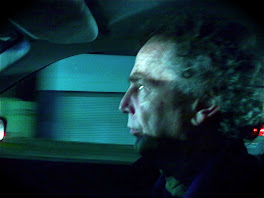Was taking some fellow from Alexandria to Rozelle when the job came through. He was telling me about how he'd had a stroke during a kidney biopsy taken to try to work out why he had high blood pressure, when all the time it was sleep apnoea that was to blame. Now, as a result of the stroke, he was half blind and couldn't remember as many of the 5000 characters of Chinese writing as he used to. So I didn't clearly focus on the job and it was only when the operator called to ask if I had the details that I realised it was one of a kind I hadn't done before: payment by driver's docket.
It was a doctor's rooms up on Darling Street. No-one outside so I left the car in the street and went in. In the corner of the waiting room was a gent in a beret who looked like a Scotty. He was painfully slow, coming out of the room, along the corridor, out the front door, into the street, into the car. Various irate motorists bellowed on their horns but I felt justified in holding up the traffic by the evident disability of my fare. He took his time, too. Just before getting in, he pointed at the facade of the building across the road. There was a figure carved out of white stone at the apex of the arch, silhouetted against the evening sky. Who's that? he said. Athena, I replied, wondering if it was in fact her. Humph, he said. She has the attributes.
I've only got one leg and one hand and my wife's just left me, he announced when he was settled and we were on our way. With a kind of grim satisfaction. She's sick of looking after me. Says she wants some time to herself. There was a pause. It seemed I needed to say something. Where'd she go? I asked. To her brother's, he said. She comes back every morning to cook my breakfast and spends the whole day looking after me then goes home at midnight. She does more for me now than when she lived with me.
He was Irish not Scots and had recently returned from a visit to the ancestral home. It was everything you'd expect of Ireland, he said, describing a castle 350 years old from which the dust had never been cleared. Cobwebs hung from floor to ceiling and in the library the leather-bound, gold-spined books were thick with grime. My wife's a librarian, he said. She's going back to clean up all those old books. Worth a fortune. I looked sideways at him. He was expressionless. After she finishes leaving me, he said. When we've got the place set up so I can look after myself. It's not so hard. Mainly just things like tying my shoe laces. Things that need two hands.
Turned out he was a writer. Had been to Duntroon, the military academy, and had fought with the South Vietnamese Army - the ARVN - as an adviser during the Vietnam War. That's what his next book was to be about. Bryce Courtenay came to me, he said, and asked if he could write it. I said no. He said, come on, Michael, I'd do a better job than you. No, you won't, I said. Yes, I will, he said. I'd write it as fiction whereas you'll probably write it as non-fiction. Fiction outsells non-fiction ten to one.
He expatiated for a while upon the marketing genius of Mr. Courtenay then said: He gave me this book of his to read. Called Smoky Joe's Cafe. Wanted to know what I thought of it. I read it and told him I thought it was a load of rubbish. Not just the factual errors, the whole thing, he had the whole thing wrong, Vietnam wasn't like that at all. Well, next thing I know, I'm in a bookshop and it's on the best seller list! Everywhere I went, Smoky Joe's Cafe, a bestseller. It's still a load of rubbish though.
As with the news about his wife, this was delivered without acrimony, as of a curious fact about the world that I might or might not take notice of, as I wished. Was he aware of how amusing he was? I wasn't even sure of that, though reflection suggests he must have been. Anything I contributed to the conversation was listened to intently and then he went on with his tales as if nothing had been said. Telling me about the genealogy of his people and a graveyard out at Mudgee where many of them are buried.
I suppose I have to sign something, he said when I pulled into the drive of the house in Cremorne. He wrote M McDermott in a firm, rather ornate hand then began the labour of hauling himself out of the car. Was there the ghost of a smile on that otherwise grim mouth as he shuffled around the front of the car? I don't know; by then, I was busy giving the details of the fare to the operator, so I could get back from her the docket number, so I could get paid.
skip to main |
skip to sidebar
You are always at a nodal point where destiny forks ...
